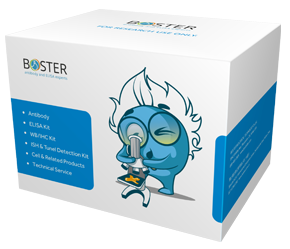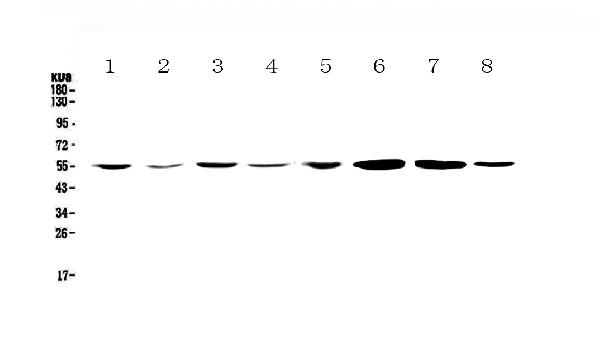Product Info Summary
| SKU: | A01748-Dyl488 |
|---|---|
| Size: | 100 μg/vial |
| Reactive Species: | Human |
| Host: | Rabbit |
| Application: | Flow Cytometry |
Customers Who Bought This Also Bought
Product info
Product Name
Anti-Human CCR3 DyLight® 488 conjugated Antibody
SKU/Catalog Number
A01748-Dyl488
Size
100 μg/vial
Form
Liquid
Description
Boster Bio Anti-Human CCR3 DyLight® 488 conjugated Antibody catalog # A01748-Dyl488. Tested in Flow Cytometry applications. This antibody reacts with Human.
Storage & Handling
At -20°C for one year from date of receipt. Avoid repeated freezing and thawing. Protect from light.
Cite This Product
Anti-Human CCR3 DyLight® 488 conjugated Antibody (Boster Biological Technology, Pleasanton CA, USA, Catalog # A01748-Dyl488)
Host
Rabbit
Contents
Each vial contains 50% glycerol, 0.9% NaCl, 0.2% Na2HPO4, 0.02% NaN3.
Clonality
Polyclonal
Isotype
Rabbit IgG
Immunogen
A synthetic peptide corresponding to a sequence at the N-terminus of human CCR3.
*Blocking peptide can be purchased. Costs vary based on immunogen length. Contact us for pricing.
Cross-reactivity
No cross-reactivity with other proteins.
Reactive Species
A01748-Dyl488 is reactive to CCR3 in Human
Reconstitution
Observed Molecular Weight
39 kDa
Calculated molecular weight
41.044kDa
Background of CCR3
C-C chemokine receptor type 3, also called CCR3 or CKR3 is a protein that in humans is encoded by the CCR3 gene. The protein encoded by this gene is a receptor for C-C type chemokines. It belongs to family 1 of the G protein-coupled receptors. This gene and seven other chemokine receptor genes form a chemokine receptor gene cluster on the chromosomal region 3p21. This receptor binds and responds to a variety of chemokines, including eotaxin (CCL11), eotaxin-3 (CCL26), MCP-3 (CCL7), MCP-4 (CCL13), and RANTES (CCL5). It is highly expressed in eosinophils and basophils, and is also detected in TH1 and TH2 cells, as well as in airway epithelial cells. This receptor may contribute to the accumulation and activation of eosinophils and other inflammatory cells in the allergic airway. It is also known to be an entry co-receptor for HIV-1. Alternatively spliced transcript variants have been described.
Antibody Validation
Boster validates all antibodies on WB, IHC, ICC, Immunofluorescence, and ELISA with known positive control and negative samples to ensure specificity and high affinity, including thorough antibody incubations.
Application & Images
Applications
A01748-Dyl488 is guaranteed for Flow Cytometry Boster Guarantee
Assay Dilutions Recommendation
The recommendations below provide a starting point for assay optimization. The actual working concentration varies and should be decided by the user.
Flow Cytometry (Fixed), 1-3μg/1x106 cells
Validation Images & Assay Conditions

Click image to see more details
Boster Kit Box
Protein Target Info & Infographic
Gene/Protein Information For CCR3 (Source: Uniprot.org, NCBI)
Gene Name
CCR3
Full Name
C-C chemokine receptor type 3
Weight
41.044kDa
Superfamily
G-protein coupled receptor 1 family
Alternative Names
C-C chemokine receptor type 3; C-C CKR-3; CC-CKR-3; CCR-3; CCR3; CKR3; Eosinophil eotaxin receptor; CD193; CCR3; CMKBR3 CCR3 C C CKR3, CC-CKR-3, CD193, CKR 3, CKR3, CMKBR3 C-C motif chemokine receptor 3 C-C chemokine receptor type 3|C-C CKR-3|CC chemokine receptor 3|CCR-3|b-chemokine receptor|chemokine (C-C motif) receptor 3|eosinophil CC chemokine receptor 3|eosinophil eotaxin receptor
*If product is indicated to react with multiple species, protein info is based on the gene entry specified above in "Species".For more info on CCR3, check out the CCR3 Infographic

We have 30,000+ of these available, one for each gene! Check them out.
In this infographic, you will see the following information for CCR3: database IDs, superfamily, protein function, synonyms, molecular weight, chromosomal locations, tissues of expression, subcellular locations, post-translational modifications, and related diseases, research areas & pathways. If you want to see more information included, or would like to contribute to it and be acknowledged, please contact [email protected].
Specific Publications For Anti-Human CCR3 DyLight® 488 conjugated Antibody (A01748-Dyl488)
Hello CJ!
No publications found for A01748-Dyl488
*Do you have publications using this product? Share with us and receive a reward. Ask us for more details.
Recommended Resources
Here are featured tools and databases that you might find useful.
- Boster's Pathways Library
- Protein Databases
- Bioscience Research Protocol Resources
- Data Processing & Analysis Software
- Photo Editing Software
- Scientific Literature Resources
- Research Paper Management Tools
- Molecular Biology Software
- Primer Design Tools
- Bioinformatics Tools
- Phylogenetic Tree Analysis
Customer Reviews
Have you used Anti-Human CCR3 DyLight® 488 conjugated Antibody?
Submit a review and receive an Amazon gift card.
- $30 for a review with an image
0 Reviews For Anti-Human CCR3 DyLight® 488 conjugated Antibody
Customer Q&As
Have a question?
Find answers in Q&As, reviews.
Can't find your answer?
Submit your question
3 Customer Q&As for Anti-Human CCR3 DyLight® 488 conjugated Antibody
Question
We have observed staining in human synovium. What should we do? Is anti-Human CCR3 DyLight® 488 conjugated antibody supposed to stain synovium positively?
Verified Customer
Verified customer
Asked: 2019-12-02
Answer
From what I have seen in literature synovium does express CCR3. From what I have seen in Uniprot.org, CCR3 is expressed in blood, monocyte, synovium, among other tissues. Regarding which tissues have CCR3 expression, here are a few articles citing expression in various tissues:
Blood, Pubmed ID: 15489334
Monocyte, Pubmed ID: 7622448
Synovium, Pubmed ID: 14702039
Boster Scientific Support
Answered: 2019-12-02
Question
Our team were happy with the WB result of your anti-Human CCR3 DyLight® 488 conjugated antibody. However we have observed positive staining in synovium cell membrane using this antibody. Is that expected? Could you tell me where is CCR3 supposed to be expressed?
Verified Customer
Verified customer
Asked: 2018-06-27
Answer
Based on literature, synovium does express CCR3. Generally CCR3 expresses in cell membrane. Regarding which tissues have CCR3 expression, here are a few articles citing expression in various tissues:
Blood, Pubmed ID: 15489334
Monocyte, Pubmed ID: 7622448
Synovium, Pubmed ID: 14702039
Boster Scientific Support
Answered: 2018-06-27
Question
We are currently using anti-Human CCR3 DyLight® 488 conjugated antibody A01748-Dyl488 for human tissue, and we are content with the Flow Cytometry results. The species of reactivity given in the datasheet says human. Is it likely that the antibody can work on dog tissues as well?
B. Miller
Verified customer
Asked: 2015-07-01
Answer
The anti-Human CCR3 DyLight® 488 conjugated antibody (A01748-Dyl488) has not been tested for cross reactivity specifically with dog tissues, but there is a good chance of cross reactivity. We have an innovator award program that if you test this antibody and show it works in dog you can get your next antibody for free. Please contact me if I can help you with anything.
Boster Scientific Support
Answered: 2015-07-01




